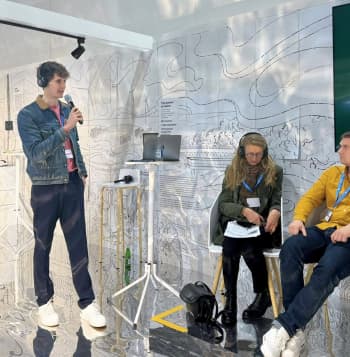Standing up for sustainability: tackling the biggest systems problem of all time
Josh Matthews (Clare Hall 2017)

The climate crisis is one of the most pressing challenges of our time. It requires urgent and collective action to reduce emissions and implement an interconnected spectrum of sustainable practices. Although we have the solutions, we've failed to put them into practice at the speed and scale needed. Alumnus Josh Matthews (Clare Hall 2017) tells us why now’s the time to take a different approach.
As Practice Leader for Sustainability at HFS Research, Co-Chair of Cambridge Alumni for Sustainability, and Founder of Critical Mass for Sustainability—a convening platform focused on systems change to address the climate and sustainability emergency—it’s fair to say that Josh is committed to championing sustainability. We spoke to him about his journey into climate advocacy:
"I grew up in Wales, but I wasn't the most outdoorsy child—certainly not for South Wales, where a lot of people surf, hike, and cycle. I lived in a very hilly area, which doesn’t make cycling seem the most enjoyable pursuit when you’re younger! I spent most of my time swimming so that meant a lot of time indoors, although cricket did keep me outside for long individual periods."
Josh studied chemical engineering at Loughborough, which included placements in the industry, studying abroad and a whole range of extracurriculars. But the real segue into climate and the environment was at Cambridge, where he studied an MPhil in Industrial Systems, Manufacture, and Management at the Department of Engineering. The course gives a detailed view on manufacturing engineering, including production processes, operations management, supply chains, data and strategy, and industrial economics.
"We had weekly site visits to different companies, went overseas to Taiwan and Korea, and took on four consulting projects, which meant that we could go into the more commercial side of engineering and experience working for both large and small companies."
Sustainability is probably the biggest systems problem of all time.
An early lecture as part of his MPhil at Cambridge proved to be a catalyst moment for Josh, kicking off his trajectory into sustainability.
"We had a lecture about industrial sustainability and the lecturer, Steve Evans, asked a simple question, 'What makes you angry?' And then he went off on a tirade about industrial waste. There was something about the broader sustainability problem: the climate and biodiversity challenge coupled with the wider social and economic issues seemed to make sense in a horribly frustrating way.
I started to see things as systems—the whole complexity of an issue fitting together—and not just think about individual problems. Sustainability is probably the biggest systems problem of all time. You've got environmental emergency, social injustice, and all the economic aspects which underpin both. These problems all intersect and must be solved together; luckily, I’ve always been better at looking at the bigger picture. At Cambridge, the MPhil helped me move beyond my chemical engineering background into the strategy and business side of things, blending what you might expect MBA students to study with the engineering context."
Right sphere, right time: consulting for sustainability
After finishing his studies at Cambridge Josh joined global research and advisory firm HFS Research, where he was able to mould his role to fit a newfound sustainability passion and work with big consulting, technology, and business services to develop sustainability solutions.
Over the next few years, Josh worked on various sustainability, industry, technology, and business projects, and attended COP26 in Glasgow to speak about sustainability in procurement and supply chains. But no matter which path he took, he kept coming up against similar blockers. The way that we looked at tackling the climate crisis needed to change.
Out of this realisation, Critical Mass for Sustainability was born. It’s a convening platform focused on systems change and creating ‘positive tipping points’ to pull politics, consumer behaviour, and business into alignment with the Paris Agreement and UN Sustainable Development Goals.
Josh punting on the Cam during his MPhil
Josh punting on the Cam during his MPhil
Playing the Clare Hall annual cricket match, 2024
Playing the Clare Hall annual cricket match, 2024
"It started as a PhD idea. Collaboration to address the climate and sustainability emergency isn’t new, but it’s largely failed. It’s fragmented and often lacks clear goals that align with and connect the whole global context. So much positive collective energy is either unfocused or ignored. On one end, you've got the people and the organisations with the ambition to move but who are struggling to turn that momentum into focused, tangible change. At the other end, you’ve got companies that aren’t actively looking to embed sustainability into their practices. It begged the question: What critical mass could evoke change, proving that sustainability works on all environmental, social, and economic levels—and works for everyone, everywhere?"
The self-titled 'activist-analyst'
"That came from an event where I was asked to briefly introduce myself. I said, 'I'm Josh. I'm somewhere between an activist and an analyst', and that just stuck in my mind. We have activist investors and shareholders, so why not activist analysts? The more I thought about it, the more it captured quite nicely that balance between the objective side of sustainability, whilst not shying away from the emotive side—the activism. It’s important to have that science and data-driven background but you also need the passion to act on what you're learning—and tap into the power of storytelling, given we remember stories over 20 times better than facts.
I recently re-joined HFS as the 'Practice Leader for Sustainability', so when the balance between activist and analyst skews more towards the activist side, I channel it through the Critical Mass platform."
Josh speaking at COP26 in Glasgow, 2021
Josh speaking at COP26 in Glasgow, 2021
Josh modelling “Minefield” honey after chairing a discussion at the Ukraine Pavilion at COP29
Josh modelling “Minefield” honey after chairing a discussion at the Ukraine Pavilion at COP29
Integrating a powerful alumni base into global channels for change
Josh is also a driving force behind the newly formed Cambridge Alumni for Sustainability (CAS), a group dedicated to bringing like-minded people together to collaborate toward sustainability. The group spun out of Cambridge Climate Society (CCS), the student equivalent society, and runs in-person meetups and collaborations with other alumni groups like CAMentrepreneurs.
"We’re now looking to get involved with CCS and its mentor programme, as many of their members will soon be looking for either internships or graduate jobs in climate and sustainability. I'm quite excited about CAS’s growth. The more formalised we get, the more we want to reach out to our counterparts at other universities to try and bring together people with a similar passion. I want it to be an open space for people to exchange ideas and feel that they can contribute in some way.
We have some regional events coming up in Dubai and India, as well as several in London and Cambridge, and we've had people from across all continents reaching out saying they would like to try to organise something locally; the difficulty is always finding enough people to facilitate. We really need regional coordination officers, whether that’s sourced from existing CAS members or other Cambridge alumni groups across the world who are keen to partner with us."
As with Critical Mass for Sustainability, CAS’s strengths lie in convening, bringing a diverse group of people together to share knowledge and ideas, which can then be implemented in their professional lives—maximizing their positive spheres of influence.
It’s important to have that science and data-driven background but you also need the passion to act on what you're learning
"Most of our members are actively working on something sustainability-related, but not all. Some just have an interest or at some point want to pivot their career in that direction. Our events are in no way exclusive: the more people working on the issue the better. I've met some people through CAS who I am now working with professionally because either they have some incredible expertise that I can feed into my research, or they are working on a similar problem that we can come together to solve."
The rollercoaster of climate work and a roadmap for the journey
As well as a networking platform, CAS also serves as a much-needed space for airing their sense of exhaustion deriving from a lack of progress despite hard effort.
"The energy in the rooms when we bring people together is so positive. People want to come together and talk about what can be a very draining topic: from despair at the trillions in investment and subsidy still going into fossil fuels, to the frustration of a coffee shop serving dine-in drinks in disposable cups. It reminds you of the bigger, systematic issue, I think. I wrote a piece called the 'COP Emotion' after COP28 last year, detailing this strange sensation of being pulled back and forth between feeling incredibly optimistic and energised by so many people trying to do something about this huge problem, coupled with feelings of utter desolation witnessing what was happening on the global negotiating stage and how much progress we still hadn't made."
So, just who is responsible for leading the way to change?
"There’s a narrative that still has too much weight: that it's down to individuals to deal with climate change and sustainability through their actions and decisions. While we can all make positive contributions, sustainability is such a global systemic problem that the most influential businesses and governments need to lead. The UK is experiencing a cost-of-living crisis—you simply cannot expect people living paycheck to paycheck, struggling to feed their family or to heat their home, to make what can be more expensive and time-consuming decisions. Even I struggle to decide what supermarket product is more sustainable sometimes and I think about this stuff 24/7!
The real onus is on policy and business to show that the models that have been developed do work."

For those who want to do more, Josh has this advice:
"If you're unsure what direction to start from, then look at the UN Sustainable Development Goals and think, 'What are my strengths? What am I passionate about? What makes me angry? What do I want to fix?' Then look at the industry that you work in, and think, 'What's my sphere of influence? What can I do?' Try not to get too down thinking that there’s too much to solve on your own because we need people working on every part of the problem. That's why I choose to spend as much of my time working on systems change as I can.
Together, we need to create those positive tipping points—at each point of the system—and we need them very, very soon."
Interested in joining Cambridge Alumni for Sustainability?
Sign up to their mailing list on the alumni website, visit the CAS LinkedIn page, or connect with Josh on LinkedIn.








